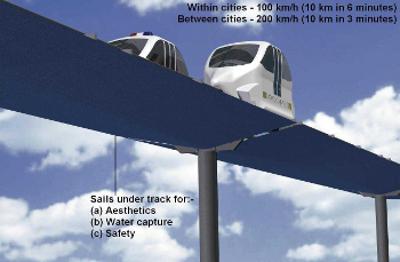
|
Rain Water Harvesting:-
The columns will provide temporary storage reservoirs. At
the base of each column, a small pump will pump the water into a pipe
suspended under the tracks to reservoirs in various suitable
Water Quality:-This water will be of high quality as it will have had no contact with the ground or any vegetable matter. Due to it's high quality, the water will require only basic treatment before being pumped directly into the water reticulation system, obviating the need for large diameter, long distance, costly trunk water mains from new dams etc.
Volume Harvested:-In 2006 (a dry year), the recorded rainfall at the Gold Coast Seaway was 1072.8 mm and at Coolangatta was 1740.2 mm giving an average of 1406.5 mm for the Gold Coast. In 2006, the MonoCab VRT 200 km proposal for the Gold Coast would have captured 2,530 ML of water. This is equivalent to 19.5 days supply for the Gold Coast at the Council's target consumption of 130 ML per day. This would have provided the water needs of 34,680 Gold Coast residents for a year at the usage rate of 200 L of water per person per day. The 2,530 ML is equivalent to the capacity of 1,265,850 water tanks of 2000 L capacity. Assuming an installed cost of $1,500.00 per water tank, the MonoCab VRT solution supplants the expenditure of $1,898 million for water tanks for equivalent water capture. Points of Interest:-Less than 1% of the world’s fresh water (or about 0.007% of all water on earth) is readily accessible for direct human use. The United Nations estimates that two-thirds of the world's population will not have reliable supplies of potable water by 2025 if current trends are not reversed. In 2002, the United Nations Committee on Economic, Cultural and Social Rights declared access to water a human right, stating that water is a social and cultural good. It has been estimated that for every two litre bottle of water on the supermarket shelf, energy equivalent to a half litre of oil has been utilised in the its manufacture and distribution. A reliable supply of potable water is becoming quite critical in many parts of the world. Entering "potable water" in Google will return many entries showing concerns by Governments and their citizens. In particular, go to the water.org web site.
|
|
During public displays of our MonoCab VRT model, we conduct a written survey (name, address and comments). We
also ask respondents two questions:- The Response:- |

